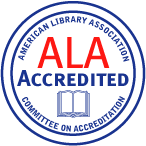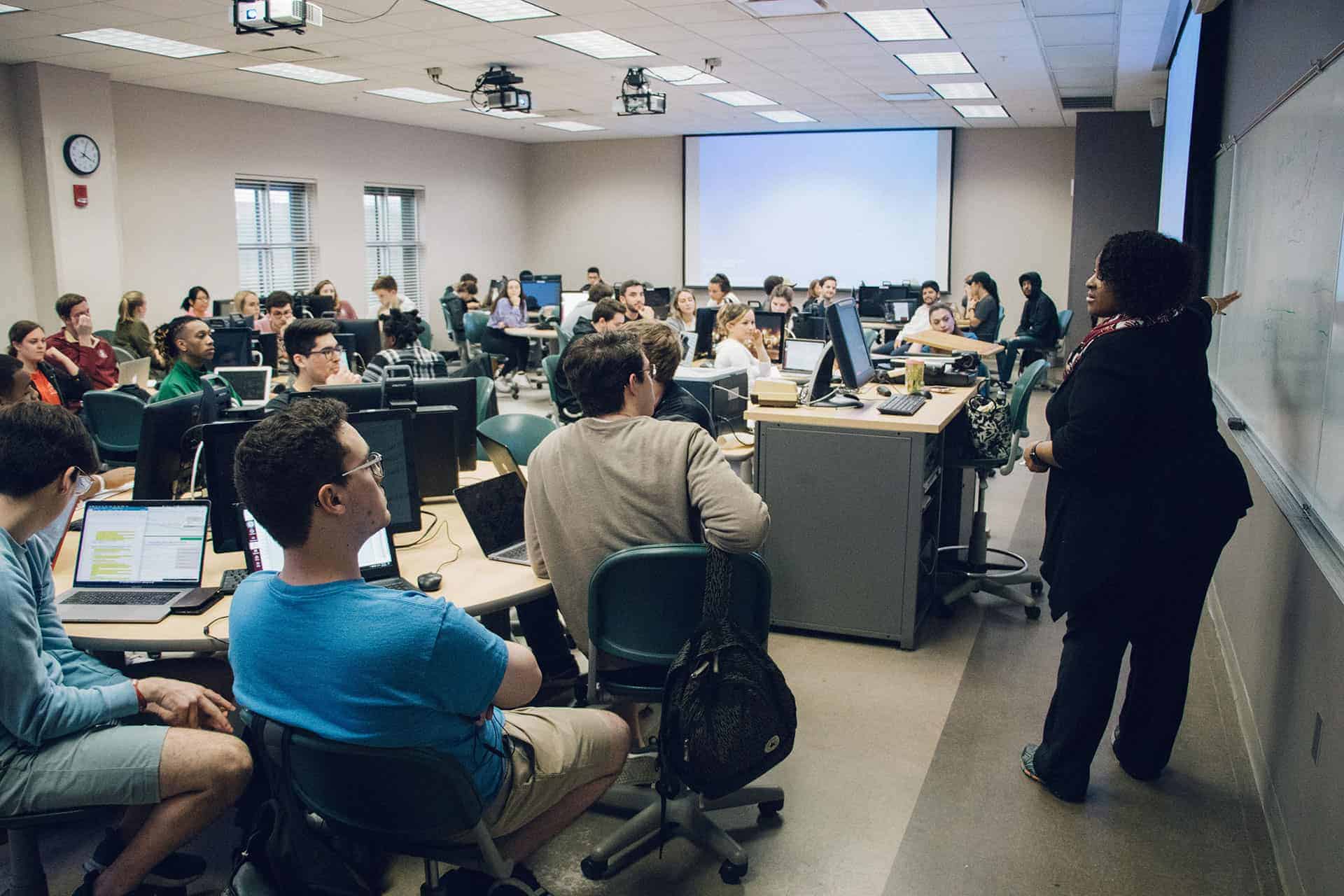School of Information Master’s/Specialist Graduate Student Handbook
The Master of Arts in Information (MAI) requires 36 semester hours, including four required core courses and one technology skills requirement course.
Students in the MAI program must also opt to complete 6 or more semester hours of graduate credit in a field outside of Information (see below). In addition, they must demonstrate proficiency in a foreign language.
Proficiency in foreign language may be demonstrated by:
- Certification by the appropriate language department, or
- Completion of 12 semester hours in a foreign language with an average grade of at least 3.0 (B), or
- Four years of a single language in high school.
While it is possible to complete both programs online, we can only guarantee the availability of fully online courses through the MSI degree program–any electives for the MAI in other fields may be offered online or in-person.
Students must first be formally admitted to the Master of Science in Information (MSI) degree program, then request a program change to the Master of Arts in Information by emailing ischooladvising@cci.fsu.edu.
Students should fill in their Advising Worksheet using the Course Rotation Schedule linked at the top of the Graduate Course Descriptions page.
Master of Art in Information Courses
Required Core Courses (3 credits)
LIS 5271 Research Methods in Information Studies (3 credits)
LIS 5411 Introduction to Information Policy (3 credits)
LIS 5408 Management of Information Organizations (3 credits)
LIS 5703 Information Organization (3 credits)
Technology Skills Requirement (3 credits)
The FSU iSchool is committed to educating students to have the technology skills necessary to be successful information professionals. Accordingly, all MAI students are required to take at least one technology-focused course prior to completion of the degree.
LIS 5485 Introduction to Information Technologies (strongly recommended for students with no prior IT background)
LIS 5255 Information, Technology, and Older Adults
LIS 5275 Usability Analysis
LIS 5313 Digital Media: Concepts and Production
LIS 5362 Design and Production of Networked Multimedia
LIS 5472 Digital Libraries
LIS 5484 Introduction to Data Networks
LIS 5486 Managing Makerspaces
LIS 5489 Network Administration
LIS 5765 Data Mining and Analytics
LIS 5775 Organizational Information Security
LIS 5782 Database Management Systems
Outside the Department Courses (6 credits)
6 or more semester hours of graduate credit must be taken in one or more of the following fields:
- art
- classical language
- literature
- civilization
- communication (not to include speech correction)
- English
- history
- humanities
- modern languages and linguistics
- music
- philosophy
- religion
- theatre
Elective Courses (24 credits)
The remaining credits may be taken from among any LIS-5000 level course and are selected depending on the needs of the student, the current technology skill level, and the foundation needs to support the student’s professional goals. View a list of our course offerings and course descriptions.
Time to Completion
- Course work for the Master degree must be completed within 7 years from the time the student first registers for graduate credit.
- Any graduate work transferred from another institution must have commenced not more than 7 years prior to completion of the degree for the credits to be applicable to the Master’s degree.
- Exceptions may be appealed through the School of Information.
Programs of Study
To help facilitate course selection, courses have been organized into programs of study along general and specialized areas of interest. These programs of study are not required for graduation and do not result in any further notation on the diploma or transcripts, but rather function as a planning and advising tool for the students. Programs of study may help to guide your course selection in order to facilitate achievement of your career goals. They include:
Certificates Programs
Certificate Programs are also available while pursuing a Master of Arts degree within the School of Information. Certificate programs are designed to provide an opportunity for professional development and result in an award separate from the diploma with the successful completion of select coursework for the certificate. Learn more about the types of certificates offered at the School, as well as certificate program requirements.
Thesis Option
Students pursuing the Master of Science in Information or the Master of Arts in Information have the option to complete a thesis as part of their curriculum. The subject of the thesis must be within the major field and must reveal independent investigation and knowledge of the methods of scholarship.
To complete the thesis-type program, a student must complete all requirements for the master’s degree. Six hours of the required 36 degree hours must be thesis hours (LIS 5971 – 3 hours per semester over two semesters). A student must officially declare that he/she wants to pursue a thesis-type program by emailing School of Information Graduate Student Services requesting a change to thesis-type track and identifying the major professor who will supervise the thesis. The student, in coordination with the major professor, must complete the necessary paperwork to appoint a supervisory committee. The Supervisory Committee consists of at least three members: the major professor; the minor professor (if the student has a minor area); and one or two additional members from the major department. Additional members may be appointed if deemed desirable. All members of the committee must hold Graduate Faculty Status.
Students must also follow the University guidelines for completion of a thesis-type program as listed in the University Graduate Student Handbook as well as all requirements for manuscript clearance.
Graduate Academic Advising
The faculty advisor can be a good resource for advice concerning course selection and/or career opportunities within the profession. Students are encouraged to seek out faculty with similar areas of interest for advice in course selection and/or career opportunities. Find more information about the faculty by visiting their biography pages.
Student Services
iSchool Student Services is the primary point of administrative contact for all graduate students enrolled in the School of Information. Some of the tasks performed include: providing information about admission and program requirements, answering questions about orientation and registration, and clarifying College as well as University policies and procedures.
Contact Us
School of Information – iSchool Student Services
258 Louis Shores Building (LSB)
School of Information
Florida State University
Tallahassee, Florida 32306-2100
Voice: (850) 645-3280
Email: ischooladvising@cci.fsu.edu
Fax: (850) 644-9763
Graduate Funding Information
Cost of Attendance
Estimated Tuition/Fee Costs for the 2023-2024 Academic Year:
Tuition and Fees for all online graduate courses offered by the School of Information include a combination of state-required tuition/fees plus an additional fee called an auxiliary fee that is assessed for online classes. The specific breakdown of tuition and fees depends upon your residency status for tuition purposes. Below are the estimated costs per credit hour for the 2023-2024 academic year.
Master’s Programs
Leon/Gadsden/Wakulla county residents*
Florida Residents – $579.32/semester hour
Non-Florida Residents – $1,210.72/semester hour
*Students residing in Leon, Gadsden and Wakulla counties are assessed additional activities and service fees for available on-campus services, such as University Wellness Center, Leach Center, Parking and Transportation.
All other locations outside of Leon/Gadsden/Wakulla county residents
Florida Residents – $544.26/semester hour
Non-Florida Residents – $1,175.66/semester hour
Reduced Tuition Market Rate (MSI program only) – $644.34/semester hour
Additional Fees
In addition to the per hour rate listed above, the University also assesses the following fees to all students:
- Facilities Use Fee – $20 flat fee per semester
- Technology Fee – $5.16/semester hour
- FSU Card Term Fee (Fall & Spring only) – $5.00 flat fee per semester
Academic Common Market
The Academic Common Market (ACM), a program of the Southern Regional Education Board, is an interstate agreement among southern states for sharing academic programs. Participating states enable their residents who qualify for admission to enroll in specific on-campus and online graduate programs in other states without having to pay out-of-state tuition. Arrangements traditionally are limited to programs not offered by the public institutions within the student’s state of residence. In short, students who obtain ACM certification pay tuition at FSU’s in-state rate.
Currently, the following states will certify ACM for the individual programs listed below.
Master of Science in Information
Arkansas, Delaware, Louisiana, Virginia and West Virginia
Post Master’s Specialist
Arkansas, Delaware, Georgia, Kentucky, Louisiana, West Virginia
Doctoral Program
Arkansas, Delaware, Georgia, Louisiana, Mississippi, Tennessee, Virginia
Visit the Southern Regional Education Board for more information.
Market Rate
The FSU School of Information offers a reduced tuition program to qualified out-of-state students pursing the Master of Science in Information:
- Who cannot receive certification from the Academic Common Market (ACM) in their state, OR
- Whose state of residence is not a member of the ACM.
To Qualify
- You must be a degree-seeking student enrolled in the Master of Science in Information program.
- You may NOT be a resident of an Academic Common Market state through which you could apply for ACM certification for reduced tuition
- You must NOT be the recipient of a Graduate Assistantship, Teaching Assistantship or Research Assistantship at FSU.
This reduced tuition program can only be applied to LIS 5000-level online courses. If you register for courses in another department, regular non-Florida resident tuition rates will apply to these non-iSchool courses. This program is renewable on a semester-by-semester basis and is contingent upon appropriate levels of funding available to The School of Information. You must remain in good academic standing (no academic probation; no dismissal) with the department and the University.
For more information about current Market Rate Program costs, contact Graduate Student Services.











